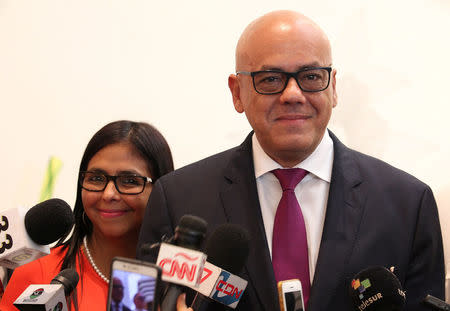Latin American nations seek Venezuela crisis mediation
By Jorge Pineda and Andrew Cawthorne SANTO DOMINGO/CARACAS (Reuters) - Four Latin American nations will join an attempt to mediate Venezuela's political crisis in new talks later this month, the president of the Dominican Republic said on Thursday. Danilo Medina hosted high-level delegations from Venezuela's feuding government and opposition for two days in the latest foreign-led effort to ease a standoff alarming the world. "We advanced definition of an agenda on Venezuela's big problems. A commission of friendly countries was agreed," the Dominican leader told reporters, saying Mexico, Chile, Bolivia, Nicaragua would join the process. The next talks would be held on Sept. 27, again in the Dominican capital Santo Domingo, he added. Mexico and Chile have been bitterly critical of President Nicolas Maduro's socialist government over rights and democracy issues, while fellow leftist-led Bolivia and Nicaragua are staunch allies. Venezuelan's government is eager to ease foreign censure of and its delegates came out of Thursday's talks smiling. "A dialogue of peace is being installed so that Venezuela can resolve its affairs among Venezuelans," senior Socialist Party official Jorge Rodriguez told reporters. Earlier, opposition leaders, who faced a backlash from supporters after failed talks with Maduro last year, insisted they had only travelled to push long-standing demands, including a presidential election and the release of jailed activists. Decrying Maduro as a "dictator" who has wrecked the OPEC member's once-prosperous economy, Venezuelan opposition leaders led street protests earlier this year seeking his removal that led to the deaths of at least 125 people. Maduro says they were seeking a coup with U.S. connivance. Though both sides met the Dominican president this week, it was unclear if they had sat down and talked together. The government delegation included Delcy Rodriguez, leader of Venezuela's all-powerful and pro-Maduro Constituent Assembly whose creation brought widespread foreign condemnation as it overrides the existing opposition-led congress. The opposition side included Julio Borges, head of that congress, fresh from a trip to Europe where he was received by the leaders of Germany, France and Spain. "There is no restart of dialogue," the opposition Democratic Unity coalition had said in a statement on Thursday morning, saying its representatives were invited by Medina purely to "explore" conditions for possible negotiations. "The opposition coalition decided to send a delegation to meet President Medina in order to expound the objectives of the national democratic struggle," it said. Maduro routinely calls for dialogue, but his adversaries suspect he wants to use talks as a stalling tactic to help his image without producing concrete results. A dialogue process brokered by former Spanish Prime Minister Jose Luis Rodriguez Zapatero and the Vatican in 2016 did nothing to advance opposition demands, which also include respect for the opposition-led legislature and measures to ease Venezuela's economic crisis. (Additional reporting by Diego Ore in Caracas; Writing by Andrew Cawthorne; Editing by Jonathan Oatis)


